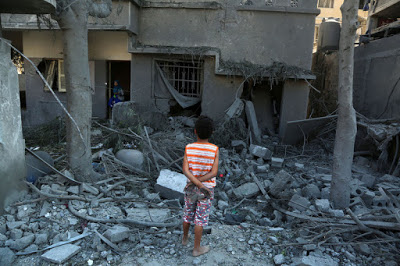Why do aid donors embrace Israel’s “iron fist” general?
 |
| Maureen Clare Murphy 30 September 2019 |
Israeli military leaders should be on trial in international courts, not seated around donor conference tables.
And yet Israeli military representatives met donor countries last week at a biannual conference to set the agenda for international aid to Palestine.
The Ad Hoc Liaison Committee conference was hosted by the United Nations, a world body that professes to be concerned with upholding and protecting human rights.
Israel was represented at the donor conference by Kamil Abu Rukun, who oversees COGAT, the bureaucratic arm of its military occupation. He was joined by Sharon Biton, who heads COGAT’s euphemistically named Civil Affairs department.
COGAT is tasked with deciding which Palestinians receive permits to access life-saving medical treatment; many don’t. The military body plays a central role in Israel’s complete system of control over Palestinian movement.
Forcible transfer
The military bureaucracy’s Civil Administration, meanwhile, incrementally dispossesses Palestinians from their land. It executes a policy of forcible transfer – a war crime.
This time last year, Abu Rukun threatened to “use an iron fist” against Palestinians protesting Israel’s naval blockade on Gaza.
Israel’s ambassador to the UN, Danny Danon, told the UN General Assembly last week that Hamas is to blame for the deterioration of the humanitarian situation in Gaza. He called for international aid in Gaza to be used as leverage to secure the release of Israelis believed to be held in the territory.
“The international community needs to connect the humanitarian situation in the Gaza Strip with the humanitarian needs of Israeli prisoners and civilian captives,” he said. “This tactic of increasing pressure will contribute to efforts to return our sons home.”
Israel wants to tie political strings to essential services like electricity and access to clean water.
As the occupying power, Israel is obliged to provide these basic needs. But it has been happy to pass off its responsibility to international development agencies and let them foot the bill.
Rotten fruit
The Ad Hoc Liaison Committee donor conference, held during the UN General Assembly meeting in New York, was born out of the Oslo peace process initiated 25 years ago.
The committee, chaired by Norway and co-sponsored by the EU and US (the latter declined to participate last week), claims to support efforts toward building a Palestinian state.
With the additional participation of the UN, World Bank and the International Monetary Fund, the committee also seeks to “promote dialogue between donors, the Palestinian Authority and the government of Israel.”
A framework that aims to build a Palestinian state under belligerent military occupation, while paying only lip service to rights and accountability, is fundamentally rotten.
It has allowed Israel to pursue its maximalist designs on the land between the river and the sea while international donors keep Palestinians on an ever-deteriorating lifeline.
In the quarter-century since Oslo, settlers in the West Bank have increased from 255,000 in 1993 to 600,000 in 2016.
The West Bank and Gaza, both subject to Israel’s economy-destroying regime of movement restrictions, have been severed both geographically and politically.
Some 4,000 Palestinians have been killed in multiple Israeli military offensives in Gaza during the past decade. That territory has been under economic blockade since 2007.
That blockade has plunged Gaza’s 2.1 million residents into poverty.
According to UNRWA, the UN agency for Palestine refugees, fewer than 80,000 Palestinians in Gaza sought its assistance in the year 2000. Nearly 20 years later, 1 million people in the territory are dependent on its emergency food aid.
With a youth unemployment rate of 69 percent, young Palestinians in Gaza are risking their lives to seek a better future elsewhere.
As do Palestinian refugees in Syria and Lebanon and beyond, denied their right to return to the lands from which they were forcibly expelled because they are not Jewish.
Pressure and accountability
The office of the UN’s Middle East peace envoy warned last week that humanitarian aid without political solutions in the context of “increasing needs” is unsustainable.
Third states “can never replace what the parties themselves must do,” the UN office stated, “to take the decisive and transformative steps necessary to change the reality on the ground.”
But only pressure – including sanctions and trials in international courts – brought to bear on Israel by third states will cause the fundamental shifts that will make a better reality possible.


